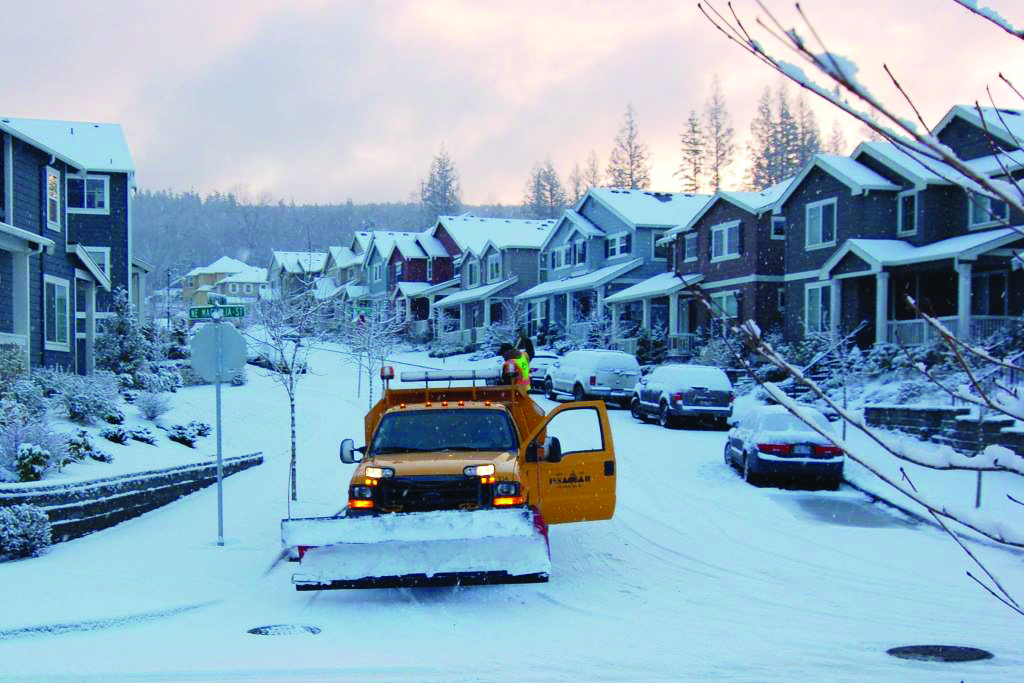
Connections featured several winter emergency preparedness stories in the November issue. Here they are, all together!
![]() Are You Ready for Storm Season?
Are You Ready for Storm Season?
By Christy Garrard, Executive Director, Highlands Council, CERT Team 9 Member, Dahlia Park Resident
This month we launch a new monthly column regarding tips for preparing for emergencies. We hope you found October’s Emergency Preparedness Connections theme helpful and that you have begun to take steps to prepare your home and emergency kits.
Fall and winter in the Pacific Northwest brings wind, snow and ice storms to our area. Don’t wait for the storm warning to jump into action or you will be standing in line for basic food needs, snow shovels, and generators; and those supplies will go quickly and you will be out in rapidly deteriorating conditions. The time to prepare is before the forecast changes.
AM 1700
is our local emergency management
radio station
The most common storm issue is a power outage. Here are a few tips and reminders from the Washington Emergency Management Office:
Before
- Register life-sustaining and medical equipment with Puget Sound Energy.
- Consider buying a generator and practice how to use it.
- Make sure you have plenty of flashlights, batteries, a wind up clock, and a battery powered radio
- Know how to open your garage door manually.
- Make sure your fireplace is operating properly. Many of the fireplaces in IH homes will also operate with D batteries. Check yours NOW for corrosion and stock up on batteries to keep your family warm and cozy near the fire when the power goes out.
- Fill the gas tanks of your car/s before the snow starts falling.
During
- Unplug your computers and other sensitive equipment to protect them from possible surges when the power is restored.
- Listen to your radio for updates on conditions.
- Heat only areas of your home that you are using.
- NEVER use gas ovens, ranges, propane grills or heaters indoors; they use oxygen and create carbon monoxide that can cause suffocation.
- Using kerosene heaters, gas lanterns or stoves inside can be dangerous. Ventilate your home and be sure to have carbon monoxide detectors to detect fumes.
- Stay away from downed power lines and sagging trees with broken limbs.
Got Snow and Ice on the Ground?
Check Road Conditions at IssaquahHighlands.com/Explore/Maps
The Highlands Fiber Network has a web cam located on top of the Starpoint Condominium building at the corner of Park Drive and 25th Ave shooting down Park Drive. This web cam is helpful when determining if it is safe to venture “down the hill.”
The city of Issaquah also has web cams located throughout the area and you can link easily to them on our website at the address above.
Drive Safe IH!
 Fall/Winter Driving Tips & Safety
Fall/Winter Driving Tips & Safety
By Melissa Schneider, IHCA Community Manager
As the days get shorter and the daylight dims early, remember to slow down and use caution in the fall/winter season. Now that the kids are back in school, they will be out in the evenings releasing all their built up energy. We want to be safe for our children and other drivers. Keep a close eye on crosswalks, sidewalks, parks and spaces in between cars where children may cross.
As we head into winter, be prepared for winter like conditions at all times, wet roadways can be just as dangerous as icy roadways. Some tips to prepare you for rainy and snowy season driving:
- Turn on headlights even during the day, be more visible.
- Replace your windshield wipers if needed and top off your windshield washer fluid.
- Slow down and don’t use cruise control.
- Leave room between you and the vehicle in front of you.
- If you hydroplane, don’t apply the brakes or speed up, steer straight and slowly let up off the gas until you regain traction. If you must brake, lightly apply pressure to the brake pedal, or if your vehicle has anti-lock brakes, apply steady pressure to the brake pedal.
- Do not cross flooded roadways, use caution and follow signs.
- If your car skids on ice, do not perform our natural instinct of slamming on the brakes. Anti-lock brakes, apply steady, even pressure to pedal (do not pump) to reduce speed and steer in the direction of the skid.
Remember, be alert, be safe!
Be Prepared for Floods, Snow
Provided by the City of Issaquah
Surrounded by the Issaquah Alps, much of Issaquah is located in a floodplain. Whether you live near water – or simply commute through town – all community members should be prepared for the next large flood. For information on how to prepare, go to issaquahwa.gov/flood.
Whether it is for floods or snowstorms, Issquah provides you information through the following communication tools. Please do your part by being informed and driving carefully!
- Issaquah’s Radio Station: 1700 AM
- Issaquah’s TV Station: ICTV Channel 21
- Website: issaquahwa.gov
- Twitter: @cityofissaquah
Before the snow falls, make sure you:
- Check your brake pads and fluid. Have brakes adjusted if necessary.
- Check your tires’ tread wear and inflation (don’t forget your spare).
- Make sure headlights, taillights and signal lights are all working.
- Check your wiper blade condition and washer fluid reservoir.
- Make sure your battery is in excellent condition.
- Check that your oil is at the correct level and the correct grade for winter.
- Ensure your antifreeze is correct for winter and hoses are in good condition.
Power Outages: Information and Safety Tips
Carbon Monoxide
To prevent carbon monoxide poisoning, never burn charcoal or use gasoline-powered equipment indoors. It’s also advised to have a carbon monoxide detector in your home.
Reporting an Outage
Puget Sound Energy customers can call 1-888-225-5773 to report power outages and receive service updates, or report outages at pse.com.
Please do not call 911 for non-emergency questions, such as power outage duration or reasons for the outage.
Winter Storms
In case a winter storm does hit, residents are urged to:
- Have personal supplies, including coats, hats, gloves and blankets ready to help you stay warm.
- Stay away from downed power lines and sagging trees with broken limbs.
- Keep vehicles full of gas.
- Check on your neighbors, especially the elderly or people with disabilities.
Emergency Kits
In addition, make sure to have an emergency preparedness kit in your home that includes:
- A battery-powered radio, along with extra batteries, that can tune in to the City’s radio station, 1700 AM.
- Battery-operated flashlights.
- A corded phone (cordless phones will not work when the power is out).
- Food and water that will last your family for several days.






